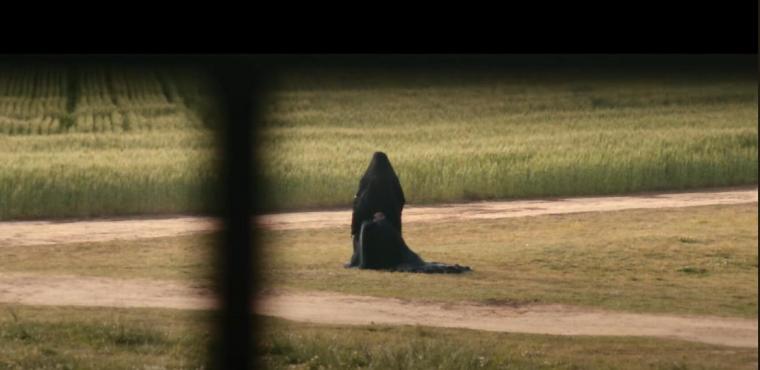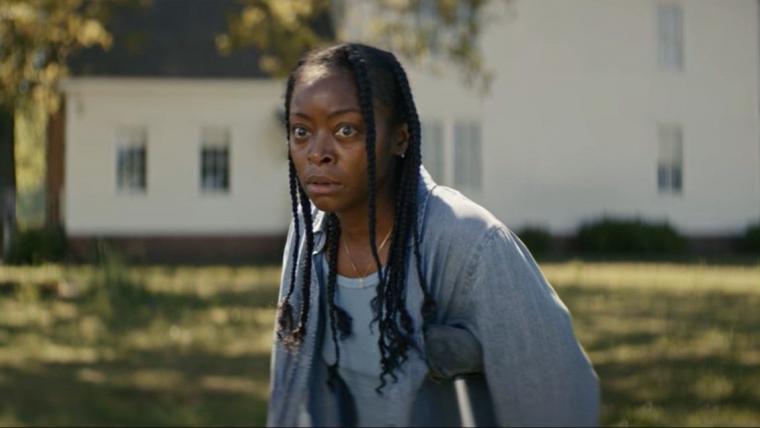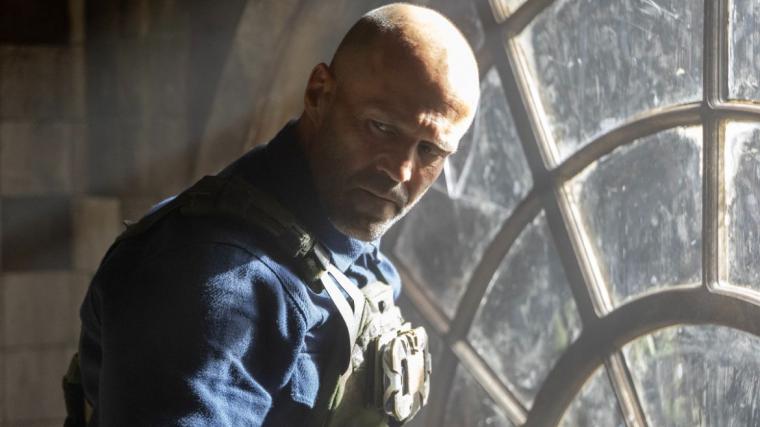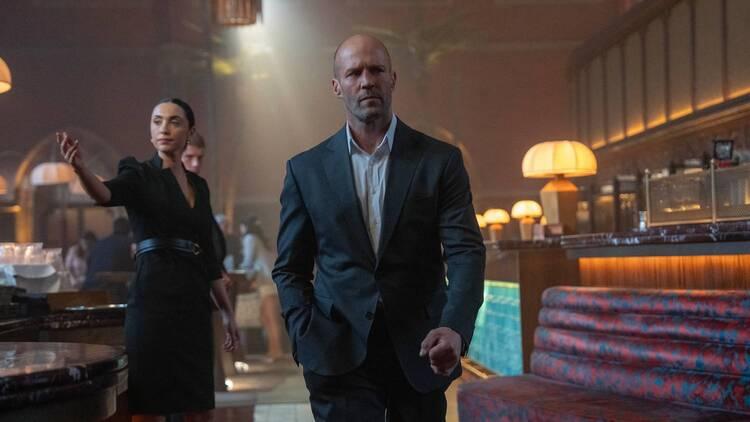
Jessica Hynes, Téa Leoni, Will Poulter, Paul Rudd, Jenna Ortega, and Anthony Carrigan in Death of a Unicorn
DEATH OF A UNICORN
Although Death of a Unicorn, the feature debut of writer/director Alex Scharfman, is a mostly good and sometimes very good time, it does have a somewhat misleading title, considering that Death by a Unicorn would be far more appropriate. Yes, a horned, magical creature does perish – at least twice. But forget its demise(s): Nothing that happens to the apparently not-mythical beast is quite as grisly as what happens to most of the movie's humans, our collection of potential victims including a Big Pharma titan and a grown man who seemingly doesn't own a pair of long pants. So, you know … it's okay to laugh if they die.
The humans we're rooting for (more or less) are Elliot Kintner (Paul Rudd), a middle-aged, middle-management rep at said pharmaceutical company, and Ridley Kintner (Jenna Ortega), his sullen, hostile teenage daughter. As Scharfman's film opens, the pair are driving to the lavish rural estate of Elliot's employer for a weekend getaway, Elliot hoping to leave with a major promotion. We're barely five minutes into the Kintners' familial bickering, though, when an animal is accidentally struck and wounded by their rental car. To their astonishment, if not ours, the bleating, suffering creature is indeed a unicorn, and a baby unicorn, at that. While Elliot tries to determine what to do given the lack of phone reception, Ridley touches the creature's horn and promptly blisses out, experiencing cosmic, euphoric visions and – in a facial expression we rarely get from Jenna Ortega – smiling from ear to ear. That grin vanishes, however, when Dad begins beating the unicorn to death with a tire iron.
This is the first of the movie's killings and it's genuinely upsetting, partly because the foal, with its watery eyes and purple blood stains, is so cute (in an obviously-CGI way), and partly because it's Mr. Nice Guy Paul Rudd who's doing the bashing. Elliot's “act of mercy” is also notable because while we're initially primed to feel sorry for the guy – a friendly-seeming widower with allergies and a daughter who resents him – our feelings are immediately complicated by the viciousness with which he takes the unicorn's life. We continue to largely dislike Elliot when the Kintners, now with a corpse in tow, finally make their way to that heavily fortified country mansion, and Ridley's father wastes no time sucking up to his perceived betters: Elliot's cancer-stricken billionaire boss Odell Leopold (Richard E. Grant), his purringly condescending wife Belinda (Téa Leoni), and their spoiled adult son Shep (Will Poulter). Countering his traumatized daughter's shock with aggressive “Everything's fine!” cheer, and demanding that the weekend go on as scheduled, it's Elliot who seems truly deranged, and we begin to wish that Ridley would simply grab the car keys and leave this noxious quartet to themselves. That plan would be more feasible if, as everyone soon discovers, the unicorn were actually dead, and if it didn't have pissed-off parents wondering where their baby was.

When Death of a Unicorn is focused on being funny, it generally succeeds, primarily because the Leopolds are such ideal 1-percenter D-bags. After it's revealed that unicorn blood has magical properties – the purple ooze heals Elliot's hay fever, Ridley's acne, and, evidently, Odell's cancer – you can practically see the dollar signs gleaming in Grant's eyes, and his unapologetic heedlessness is both pathetic and riotous. Leoni has one of her best roles in ages as a Lady Macbeth in linen who's probably happy-drugged to her teeth, and Poulter is priceless here, Shep's almost unconscious entitlement rather endearing before it turns sinister. (Poulter also gets the majority of great lines – or rather, lines the actor makes great through his consistently unpredictable, empty-headed-doofus deliveries.) Scharfman's film, though, is beautifully cast even in the minor roles. Sunita Mani and Steve Park add incredulous comic relief as resistant scientists, the excellent Jessica Hynes is Odell's chief enforcer, and no one made me happier than Anthony Carrigan, who, as the Leopolds' put-upon butler Griff, pulls off familiar routines in ways I've never seen before. Not even bothering to hide his bitterness at being treated like a lackey, Griff is a bold, hysterical, and weirdly touching creation, as well as an instant argument for more Anthony Carrigan in future movies. You really haven't lived until you've witnessed Shep's perfect reaction to Elliot's hinted request for an omelet.
Between the Kintners, the Leopolds, their house staff, and the armed guards manning the premises, that's a lot of flesh for Mama and Papa Unicorn to tear to shreds or feed off, and if Scharfman doesn't yet demonstrate much skill in creating or escalating tension, at least he has the good sense to make the death scenes satisfyingly disgusting. Among the more memorable executions, one character is ripped in half, one has their head smashed in by a hoof, one has their innards strewn about like streamers, and one got kicked so hard that they slid 10 feet, face down, on concrete – a moment that made my dad (whom I didn't realize was even awake at the time) exclaim, “Ouch!” When it's not poking fun at the ridiculously moneyed Leopolds, Death of a Unicorn is at its finest when it most resembles Cocaine Bear, making you hungry for as many delectably nasty murders-via-wildlife as possible.
That's why it's so disappointing to realize that the movie actually has a sentimental heart, and we're meant to actively care about Elliot and Ridley mending their fractured relationship. Neither Rudd nor Ortega, the latter of whom is sensational, are to blame for this being an unwinnable strategy, given that Elliot remains a craven, thoughtless (if very nice) asshole up through the final 20 minutes. For what it's worth, and despite Elliot's protestations, I think Ridley was dead-on correct, and her father was using her as a grieving prop to secure his promotion, just as he continued to make stupid choices – decisions that put his child in harm – for the sake of dough. In his nonthreatening way, Elliot is just as awful as the Leopolds, only Scharfman doesn't seem to recognize it. Consequently, we're given way too many morosely repetitive scenes involving the tortured father/daughter bond, as well as too much art-history sermonizing when Ridley uses her undergrad-major knowledge to explain both the presence of the unicorns and what may be their inherent purpose and character. It's disheartening to admit I was occasionally bored by this weird-ass project, and although Death of a Unicorn is entertaining overall, it would've been far more so if it merely stuck with the silly and skimped on the soul.

THE WOMAN IN THE YARD
Given her reliable fierceness, intensity, and gravitas, it's frankly a wonder that Danielle Deadwyler doesn't significantly outclass her Blumhouse fright flick The Woman in the Yard. She only outlasses the last half-hour.
Her right leg disabled after a car crash that took the life of her husband (Russell Hornsby), Deadwyler's Ramona lives in a spacious, remote fixer-upper as a newly single mother to 14-year-old Taylor (Peyton Jackson) and six-year-old Annie (Estella Kahiha). In constant pain, chronically depressed, and low on funds, and with the electricity now out, Ramona is in a bad state when things get worse: An unsettling, black-clad figure (Okwui Okpokwasili's titular Woman) has seated herself across the street, and appears, even to Ramona's children, to be a premonition of death, her most chilling utterance being a sing-songy “Today's the daaa-aay.” What results is something legitimately rare – trauma horror that predominantly unfurls in broad daylight – and for at least an hour, director Jaume Collet-Serra and his first-rate cast keep the proceedings appropriately creepy, and even somewhat moving.

As I mentioned in last fall's review of August Wilson's The Piano Lesson, a ghost story less overt than The Woman in the Yard, no performer seems more in need of a frothy comedy these days than Danielle Deadwyler, who's routinely hired for aching emotionalism and barely contained grief. (As outrageous as it was that the actor wasn't Oscar-nominated for 2022's Till, I also kinda get it – Deadwyler's on-screen pain was almost too real to be celebrated as a “performance.”) But Deadwyler's conviction and dramatic power absolutely ground Sam Stefanak's screenplay from moment one; you buy the supernatural premise because you buy Ramona, and viscerally feel her desire to shield her kids from danger … when she's not a direct threat to their safety herself. A traditionally hot-and-cold director, Collet-Sera does a wonderful job of establishing the film's atmosphere and revealing exposition through visual cues – the dying bouquets of sympathy flowers are a superb touch – and the youths are terrific, with Jackson at his best when trying to be “man of the house” and attempting to scare the Woman off their property with a shotgun. (Happily, this downbeat yarn isn't without laughs, and Jackson scores one of the biggest with Taylor's makeshift bravado that he clearly learned from watching Winston Duke in Us.) But this is Deadwyler's show all the way, and her nearly feral urgency keeps you invested even when you begin sensing, rightly, that the wheels are falling off the wagon.
This happens about two-thirds of the way into the movie's admirably succinct 87 minutes, when it becomes painstakingly evident that the Woman is, in effect, a metaphor – if a pretty confusing one, as she's actually able to do physical damage and there's no reason to suspect that the ghostly goings-on are merely taking place in Ramona's head. Instead of ramping tension as we approach the finale, we get disassociation and rather pushily contrived mirror imagery, and the climax, I felt, was a true blunder – the potentially evocative finale made unnecessarily messy by one visual cue directly contradicting another. I'm prone to distrust audience-tracking CinemaScore ratings, particularly those of horror movies, but the C-minus earned by The Woman in the Yard feels unfortunately appropriate. Given its strengths, Deadwyler's exceptionalism very much included, you can't disregard the film. You can, however, be very much disappointed in it.

A WORKING MAN
Back in Sylvester Stallone's 1980s heyday, Russians were the cinematic villains du jour. These days, in the wake of the startling grassroots success of 2023's Sound of Freedom, they're more likely human traffickers. So what do Sly and director/co-screenwriter David Ayer give us in as their chief nemeses in A Working Man? Russian human traffickers! This thing could've written itself! I'm pretty sure it did!
Let's keep this short, as I attended a reasonably crowded afternoon screening in which a goodly number of my fellow patrons evidently had a ball, and I most certainly didn't. Jason Statham plays Levon Cade, a former Royal Marine Commando whose killing days, he ruefully admits, are behind him. Now a half-bearded construction worker, he's brought back into murderous action by the capture of Jenny Garcia (Arianna Rivas), the teen daughter of his boss and best friend Joe (the overqualified Michael Peña). Given a $50,000 finders fee plus 20 grand for expenses, Cade systematically hunts down the traffickers, who are a veritable, collective Matryoshka doll of lowlifes and psychopaths. He butchers them all. He saves the girl. The end.

Oh crap … did I give away the finale? Of course I didn't. Because unless it's 1976's original Rocky, it's impossible to give away the finale to anything Stallone has a hand in writing. Like the man himself, at least when not co-starring in one of the Creeds, Sly's movies are blunt, immovable objects allergic to subtlety, nuance, and surprise, and that's what (some) audiences dig about them. Like last year's Statham/Ayer collaboration The Beekeeper – which Stallone had no part in – all the cards are on the table here from the start, and there's nothing to do but watch our stubbly, Cockney-accented ass-kicker enact bone-crunching revenge, this time for an interminable 116 minutes. (I was praying for a twist revealing that Peña's character was responsible for his daughter's kidnapping, as it would've given the actor something to do beyond acting bereaved, but no such luck.) Despite a number of hits, Ayer hasn't made a decent movie since 2012's End of Watch, and his haphazard cutting choices and rudimentary compositions don't suggest that one will be in the offing any time soon.
I will say that David Harbour brings some quiet elegance to his scenes as Cade's blind, heavily armed military brother, and that Rivas is occasionally appealing, and that Greg Kolpakchi and Piotr Witkowski are semi-amusing as Russian hoods clad in equally unflattering clown pajamas. But while Statham heroically puts on a hard had like John Wayne putting on a Stetson, the action star's enthusiasm appears to be visibly waning from film to film (the editing now seems to be doing the man's fighting for him), and his screen charisma isn't enough to invest A Working Man with any legitimate narrative pull. Ayer's latest may not be a sequel. But it feels like a sequel – a familiar-seeming character taking on One Last Mission you're pretty sure he took on a decade ago – and discovering that the film is based on a Chuck Dixon novel that's now 10 books into a series, and is therefore a potential franchise, is, for me, maybe the most depressing movie news of 2025 to date. And I just learned that Chris Pratt is signed for yet another reboot of The Mummy. Grim times, for sure.








